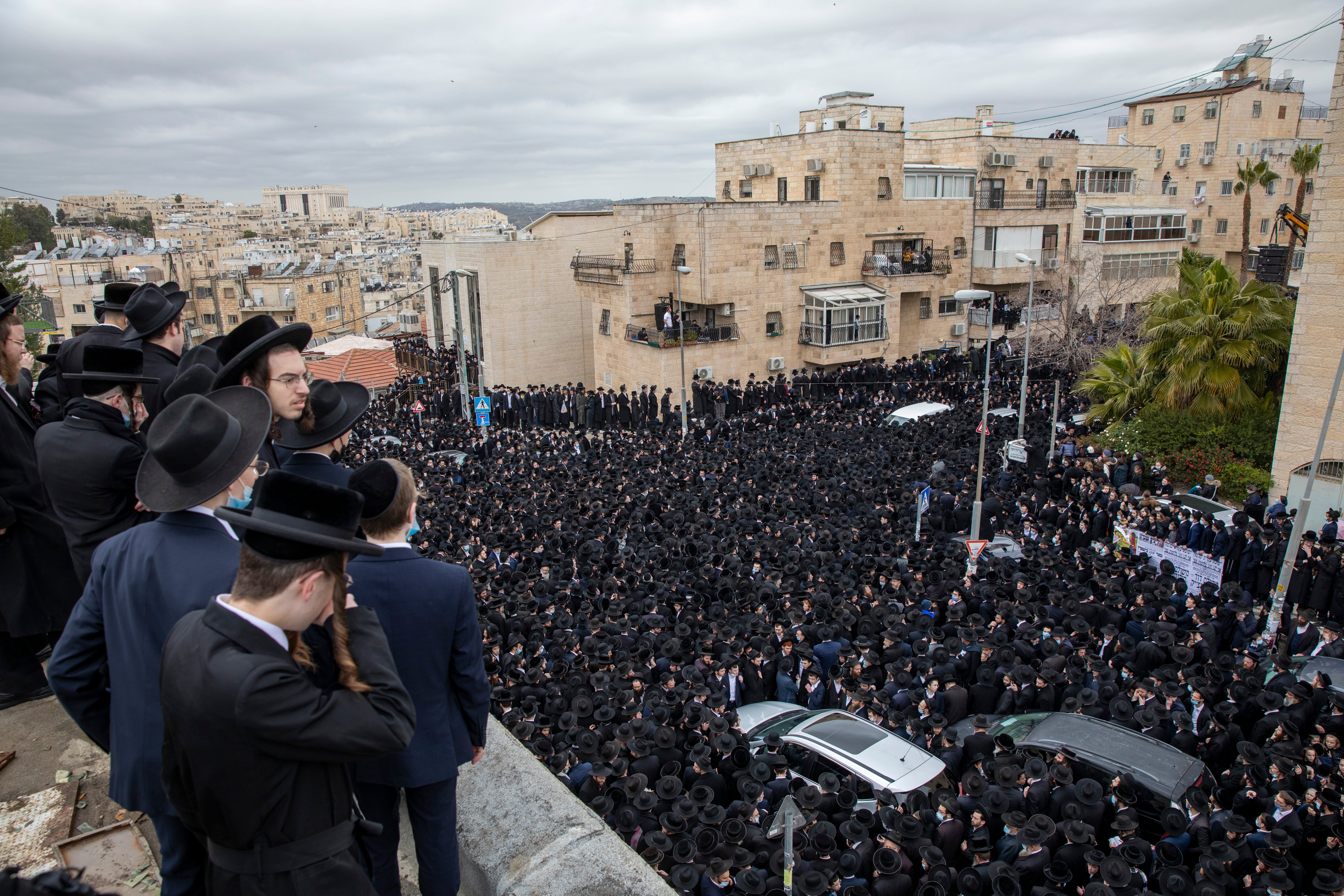Thousands join in Jerusalem funeral, flout pandemic rules
Thousands of ultra-Orthodox Israelis are participating in the funeral of a prominent rabbi in Jerusalem, flouting the country’s ban on large public gatherings amid the pandemic

Your support helps us to tell the story
From reproductive rights to climate change to Big Tech, The Independent is on the ground when the story is developing. Whether it's investigating the financials of Elon Musk's pro-Trump PAC or producing our latest documentary, 'The A Word', which shines a light on the American women fighting for reproductive rights, we know how important it is to parse out the facts from the messaging.
At such a critical moment in US history, we need reporters on the ground. Your donation allows us to keep sending journalists to speak to both sides of the story.
The Independent is trusted by Americans across the entire political spectrum. And unlike many other quality news outlets, we choose not to lock Americans out of our reporting and analysis with paywalls. We believe quality journalism should be available to everyone, paid for by those who can afford it.
Your support makes all the difference.Thousands of ultra-Orthodox Israelis participated Sunday in the funeral of a prominent rabbi in Jerusalem flouting the country s ban on large public gatherings amid the pandemic.
The funeral procession for Rabbi Meshulam Soloveitchik, who died at age 99, wended its way through the streets of Jerusalem in the latest display of ultra-Orthodox Israelis' refusal to honor coronavirus restrictions.
The phenomenon has undermined the country's aggressive vaccination campaign to bring a raging outbreak under control and threatened to hurt Prime Minister Benjamin Netanyahu in March elections.
Densely packed throngs of people gathered outside the rabbi’s home in a public rejection of restrictions on outdoor gatherings of more than 10 people. Thousands of black-garbed ultra-Orthodox funeral-goers coursed past the city's main entrance toward the cemetery where Soloveitchik was to be buried. Police officers blocked intersections to traffic to allow participants to pass, but appeared to take no action to prevent the illegal assembly.
Israeli media said Soloveitchik, a leading religious scholar who headed a number of well-known seminaries, had recently suffered from COVID-19.
Israel’s Health Ministry has recorded over 640,000 confirmed cases of the coronavirus and at least 4,745 deaths since the start of the pandemic. At the same time, Israel has vaccinated over 3 million of its citizens, one of the highest rates per capita in the world.
Health experts say it will take several weeks for the vaccination campaign to have an effect on infection and hospitalization rates. But large public funerals like that for Soloveitchik in Jerusalem, and for a prominent Arab sheikh killed in Jaffa last week, have confounded efforts to prevent the spread of the disease.
A disproportionate number of Israel’s coronavirus cases are within the country’s ultra-Orthodox minority. The strictly religious community, which makes up around 11% of Israel’s 9.2 million people, has accounted for around one-third of the confirmed cases of the virus.
Many ultra-Orthodox sects have kept schools, seminaries and synagogues open, and held mass weddings and funerals in violation of the law. Recent weeks have seen violent clashes between members of the ultra-Orthodox community flouting the rules and police officers trying to enforce them.
Ultra-Orthodox leaders say they have been unfairly singled out and argue the country's secular public does not understand the importance of public prayers and religious studies in their community.
Gideon Saar, a right-wing Israeli politician challenging Netanyahu in upcoming parliamentary elections, criticized the prime minister on Twitter, saying “the pictures from Jerusalem prove that Netanyahu has given up on enforcing the law for political reasons. This won’t happen in a government headed by me. There will be one law for all and it will be enforced.”
Israel's Cabinet was set to extend the country's general lockdown for an additional week Sunday evening as the infection rate remained high.
The government imposed the movement restrictions and closure of schools and non-essential businesses last month in an effort to clamp down on Israel's runaway pandemic.